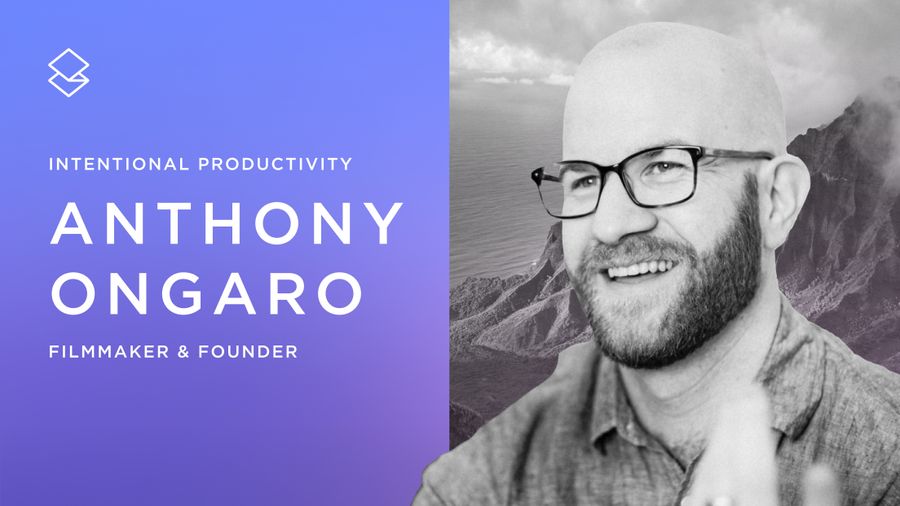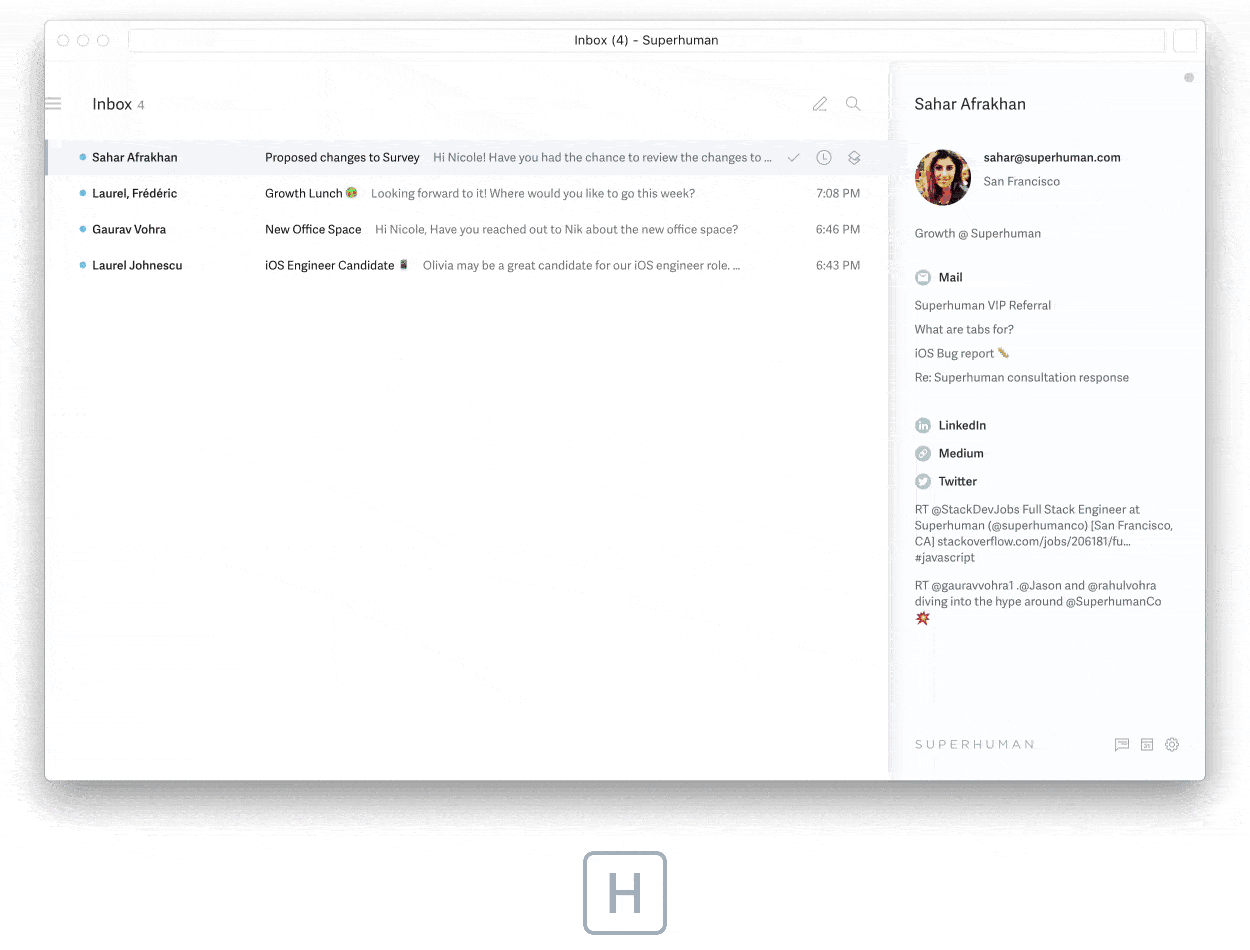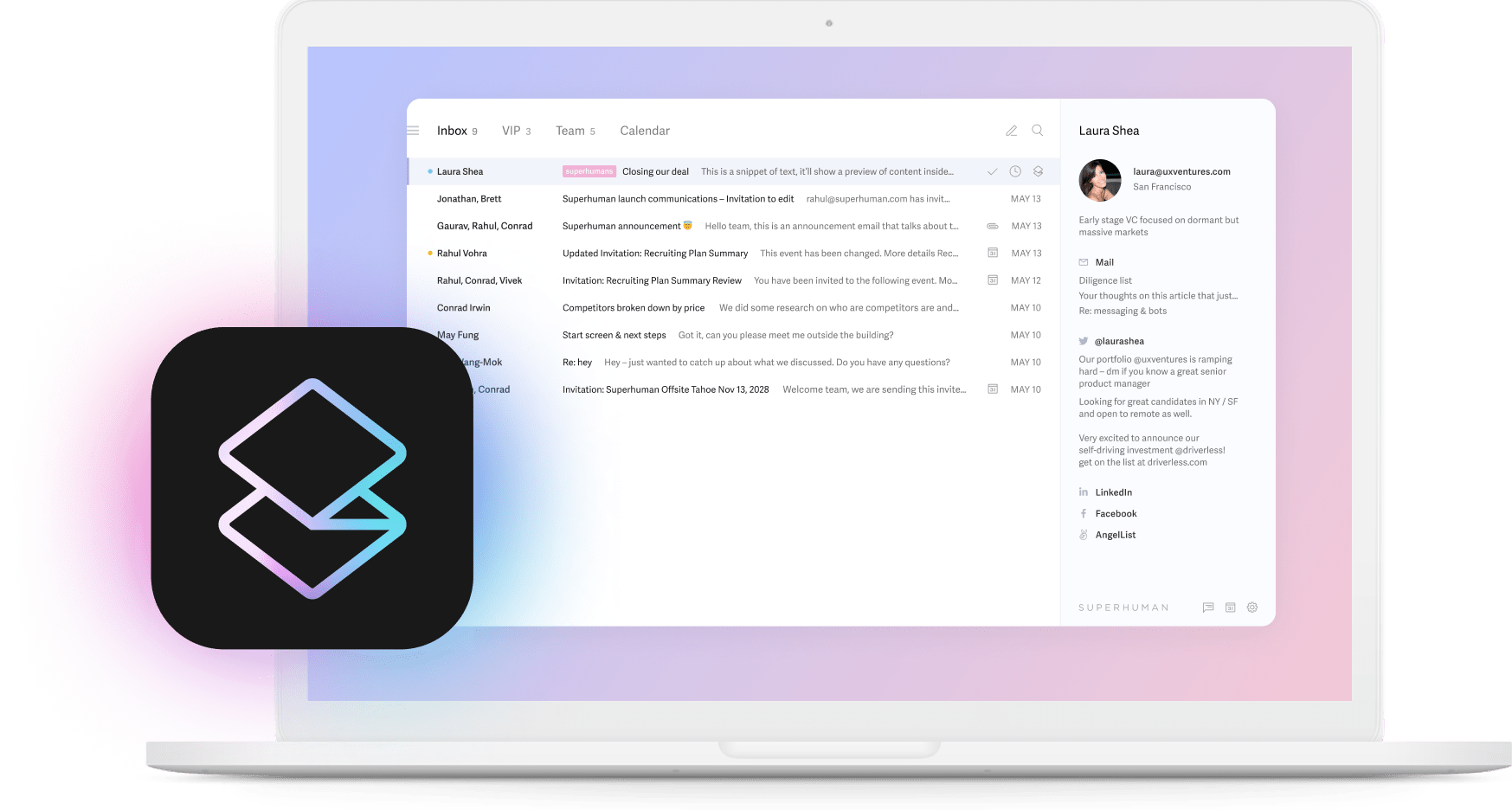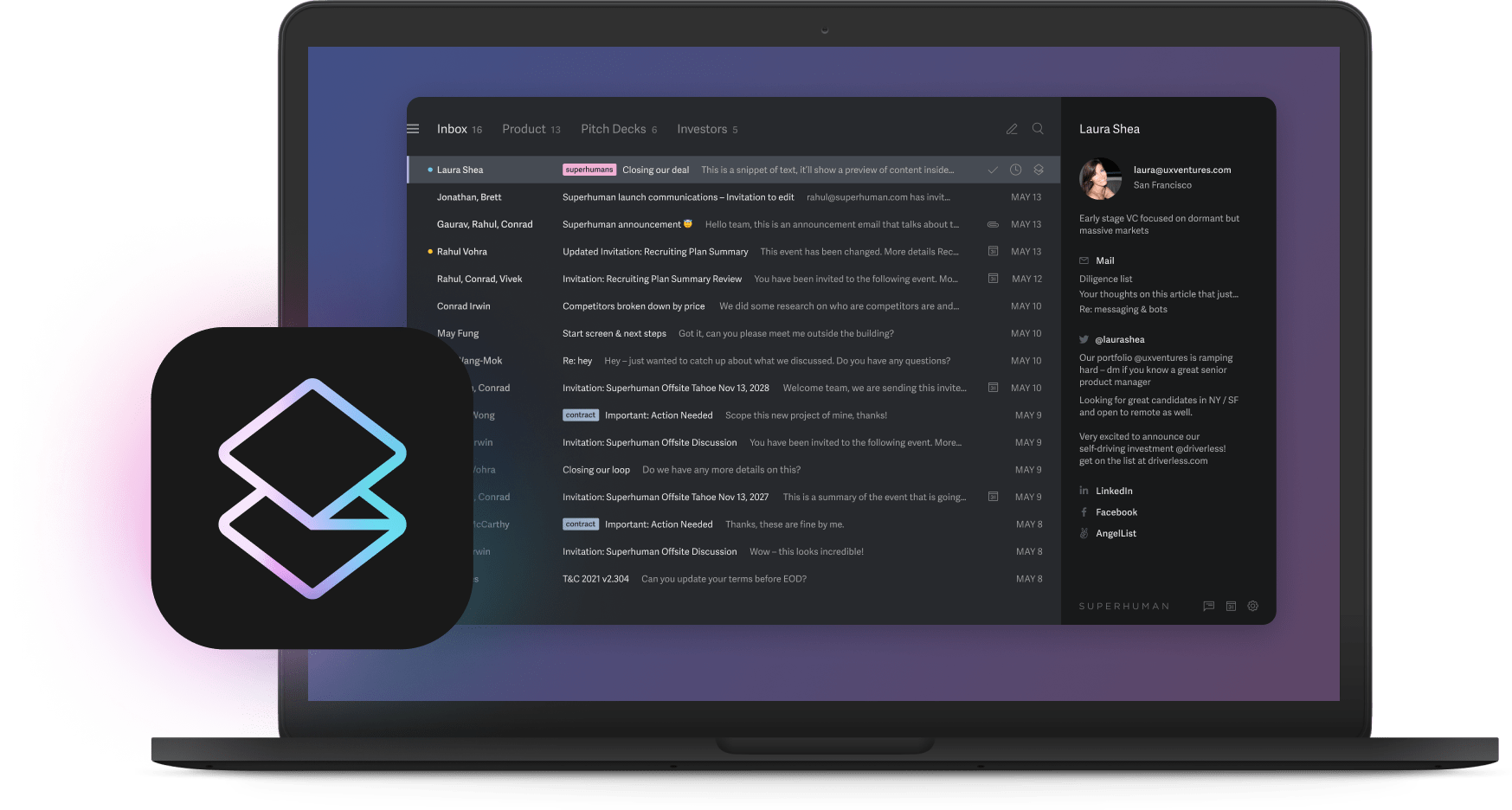
With the endless ping of notifications coming from every device, staying focused can be tough. But it's not impossible. We've been asking the world's most inspiring entrepreneurs, business leaders, and creators how they stay productive — especially as our ways of working continue to change in 2022.
We caught up with Anthony Ongaro, filmmaker and the creator of Break the Twitch, a community that helps people learn to love their attention, regain focus, and pursue intentional lives. Anthony told us all about the importance of staying present and practicing self-acceptance, and shared insightful tips for avoiding distraction while improving your well-being.
Let's dive in!

What mindset shifts are you taking with you into 2022?
The biggest shifts in 2021 came from slowing down substantially, not running from project to project, and making sure I was headed in the direction I wanted to be going. A lot of that slowing down was compounded by the pandemic, which of course affected everyone differently, but gave me an opportunity to reflect on a lot of the things I had built up to that point.
For 2022, I'm focusing on existing more in the present moment, whether doing the dishes, meditating, or working. When there's a lot to do, it's easy to get lost in the tasks and always be focused on getting through the current thing, so we can get onto the next thing. Well, there will always be a next thing, which means if we don't slow down and enjoy doing what we're doing right now, we'll always be chasing something.
We all have those times when we place goalposts for when we'll finally be happy with how things are: after this project is over, once I graduate, once I lose those last 10 pounds, etc. Yet, as soon as we reach the goal, something else inevitably comes up and the goalposts move further out. The pandemic has really helped me embrace the absolute uncertainty of life, and I've been working hard to chase the next thing less, and be with the current thing more.
What are you intentionally letting go of in 2022?
One of the considerable changes I've made over the last year is embracing radical acceptance. There's often a lot of shame hidden beneath the surface of productivity advice, as though we all have something to prove through our accomplishments and how much we get done in a day. "If I could only do more, I'd finally be… x, or y, etc." That can easily lead to working in ways that cause major burnout, and expending a lot of unnecessary energy on avoidable mistakes that only happen when we rush through things.

At the root of radical acceptance is self-acceptance, which is what I'm taking into 2022 more than anything. In the past, I've spent a lot of energy trying to make the ways I stay productive fit into other people's expectations. As an entrepreneur, you can really work on letting go of the external expectations that came from old bosses or coworkers on the "best way" to get things done. It takes time to unwind those things, but it's all a part of allowing yourself to do your best work in the way that works best for you.
What routines have you found helpful to kick off a productive and fulfilling day?
I find that 10:00 AM to 2:00 PM are my best working hours, so I build my schedule around that. It's when I get the best writing, video recording, and other creative work done. It's funny because for most of my life I was a night owl, and 10:00 PM to 2:00 AM were my best creative output hours, but at some point in my early 30s that changed.
These days, slow mornings are essential to my productivity. The more rushed and chaotic my mornings are, the more scattered and distracted the rest of my day is. I most often get up, pour some coffee for myself and my wife, do some stretching (I hesitate to call it yoga) and hang out with our pup while I get things sorted out for the day. I find it very helpful to do a bit of prep during the "wind down" phase the evening before.
Even though I'm not as much of a night owl anymore, I still find the "3 down/3 up" system to be effective for staying on track through the day.
Can you share a few of your favorite tools, tips, and techniques for reducing distractions, increasing mindfulness, and staying focused?
It's no quick fix, but building awareness around what our attention is actually telling us is an essential part of finding focus day-to-day. If we pay attention to our emotional needs, like the fear that is causing us to avoid a particular project, we're able to externalize and process that fear in a way that will allow us to focus more deeply on the project. When we're dealing with anxiety or other intense emotions, our brains do an impressive job of coming up with distractions whenever possible—even seemingly "positive" ones (like randomly cleaning the kitchen with an impending project deadline).
Physically removing distractions is a great way to set the stage for focus — as wild as it might sound, I actually bought a 1952 Smith-Corona typewriter this year. It makes it easy to just zone in 100% to the process of writing, and forces me to not second-guess what I'm typing. Since there's no delete key, I have to just let it flow and correct myself by continuing to type.
I'm not saying everyone should go out and buy a typewriter, but I'm all for everyone exploring their curiosity and seeing what unique things work. Everyone is different, so it's worth experimenting.

Finally, the breath is a powerful thing. When things get into "bouncy ball brain" territory, or I catch myself holding my breath while trying to focus on something, I remind myself: "This is it. There's nothing to hold your breath for. This is all there is, right here, right now. Be here." As much of a rush as I might be in to get the thing finished, I just stop to take some deep, full breaths. It always helps.
I've found that people are afraid of slowing down, breathing, and meditating because it makes them feel sleepy, anxious, or their brains will start to race. But, in a sense, if meditation makes you feel something, it's just uncovering what you're actually feeling. You're pausing long enough to stop distracting yourself from your current state. So try slowing down a bit, check in with yourself and see where you are and then, well, if you're sleepy… try to find an opportunity to rest! While there are always times we need to push through discomfort, ignoring our emotions and physical needs for long periods of time never ends well.
If you're working and your knee is bouncing, you're chewing on your lip, you're breathing shallowly, or you're jumping from task to task without finishing much, it's time to breathe, check in with yourself, and get grounded before proceeding.
Do you recommend any safeguards for managing communication overload?
I call it "the Twitch" and, especially these days, it's easy to get swept into constantly checking all the things(™). This is what I love most about how Superhuman helps me day to day. Sure, the hot keys are wonderful and the interface is clean, efficient, and functional, but the system within it to archive and set email reminders allows me to get to "Inbox Zero" and then close the app.

We can all admit that email is an inevitability. There will always be more. But knocking down the inbox like that allows me to bulk process emails during predetermined times of the day. That really helps reduce the twitch-temptation to be constantly accessible. Handling emails one at a time or as they come in through the day is a complete nightmare, and should be avoided at all costs.
It's important to view our digital devices as another "location" in our lives. It's a bit like stepping through a digital door every time we look at a screen. When we're on them, we're figuratively somewhere else, even though we’re physically present.
Carving out time to come back into the "now" and check in with ourselves, the people around us, and live in the actual, physical space we're in is critical. It's really all we have, and living in the present is the most human thing we can do.
You've spoken in the past about the challenges of staying productive with ADHD. What have you learned so far about your ideal environment for staying in flow?
There's the old expression "cleanliness is next to godliness", and while that's true, for me, a deeply focused state is probably one step closer. I constantly have to take extra steps to create healthy boundaries in my life to protect the focus that I actively cultivate. It's remarkable how fast social media apps can creep back in to fill up our in-between moments in life. I mean, they're designed to do that, so maybe it shouldn’t be quite so surprising.
It's not just ADHD, either! Although it may be more difficult for the neurodiverse among us, it's not the easiest thing to get back into that deep flow state where work seems to happen effortlessly. It's a pretty rare thing these days with the kinds of notifications and distractions we're subjected to across the board.
Personally, I turn off all notifications, make sure my phone is far away or screen down, so I can't see it. I try to let my family know I'm going to be writing or working on another focus-intensive task. True creative flow is pure gold, and deserves to be fostered and protected. It's the difference between writing a choppy 250-500 words on a distracted day, versus 2,500 words that seem to flow from my fingertips in a similar amount of time. Those differences each day compound substantially over time, too.
Anthony's top 5 productivity resources
- Moonwalking with Einstein by Joshua Foer: Incredibly fascinating and inspiring book that changed my perspective about how capable my brain actually is. You learn that much of what seems like natural talent is simply training and established systems.
- Permission to Feel by Marc Brackett: Emotions control so much of our day-to-day lives, yet we are often completely out of touch with what they're telling us. This is essential reading for diving into the deeper reasons behind why we struggle to focus, why we might avoid certain things and procrastinate, and how to become an "emotion scientist".
- Making Space: Creating A Home Meditation Practice by Thich Nhat Hanh: Very short audiobook, yet inspiring and densely informative on how to create a space for presence, and building a meditation practice.
- Joe Rogan w/ Singer Songwriter Jewel (Episode #1724): I've only listened to a few episodes of his podcast, but this episode absolutely blew my mind. It is dense with inspiring stories from Jewel's life and actionable insights. It’s all about self-development, self-awareness, dealing with difficult emotions, betting on yourself, and finding success.
- Obsidian: Desktop software and a mobile app for writing and linking ideas together. There are many like it, like Roam, etc., but I really like Obsidian and all it has to offer. It helps me remember what I've written in the past, and connect new ideas to old thoughts.
Anthony's top 3 tips for staying present
- Carve out time to check in with yourself and be in the actual physical space that you're in. Viewing our digital devices as another "location" can help us actively enter them — and leave them when we want to.
- Turn off all notifications while you're trying to stay in flow (and any other distractions). While this is hard to do remotely, especially if we live with other people; according to Anthony, setting those boundaries can be the difference between a hard-to-write 500 word essay and 3000 words that just come pouring out!
- Bulk process emails at specific times during the day. Even if emails are coming in — that's inevitable — let your mind rest knowing you'll get to them at the scheduled time. That way you get rid of pesky task switching and can stay in the moment.






